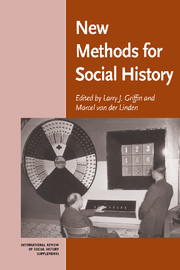Book contents
- Frontmatter
- Contents
- NOTES ON CONTRIBUTORS
- Introduction
- Temporally Recursive Regression and Social Historical Inquiry: An Example of Cross-Movement Militancy Spillover
- Using Event History Analysis in Historical Research: With Illustrations from a Study of the Passage of Women's Protective Legislation
- Incorporating Space into Social Histories: How Spatial Processes Operate and How We Observe Them
- Narrative as Data: Linguistic and Statistical Tools for the Quantitative Study of Historical Events
- The Logic of Qualitative Comparative Analysis
- Historical Social Network Analysis
- Historical Inference and Event-Structure Analysis
Temporally Recursive Regression and Social Historical Inquiry: An Example of Cross-Movement Militancy Spillover
Published online by Cambridge University Press: 04 August 2010
- Frontmatter
- Contents
- NOTES ON CONTRIBUTORS
- Introduction
- Temporally Recursive Regression and Social Historical Inquiry: An Example of Cross-Movement Militancy Spillover
- Using Event History Analysis in Historical Research: With Illustrations from a Study of the Passage of Women's Protective Legislation
- Incorporating Space into Social Histories: How Spatial Processes Operate and How We Observe Them
- Narrative as Data: Linguistic and Statistical Tools for the Quantitative Study of Historical Events
- The Logic of Qualitative Comparative Analysis
- Historical Social Network Analysis
- Historical Inference and Event-Structure Analysis
Summary
Our focus here is on time-series regression as a formal analytic tool in social historical inquiry. We have three interrelated purposes. First, we argue that conventional time-series regression is typically ill-suited for social historical inquiry because ahistorical assumptions and conventions regarding time undermine the historical character of social “process-as-analyzed”. Second, we present a modified time-series approach – temporally recursive regression – that takes time seriously and provides a more adequate analytic vehicle for social historical inquiry. Finally, we illustrate the promise of temporally recursive regression by using it to analyze how workplace militancy in post-war America was fueled by massive insurgency waves during successive phases of the civil rights movement.
AHISTORICAL CHARACTER OF CONVENTIONAL TIME-SERIES REGRESSION
Conventional time-series regression contains a conception of time that is ahistorical in character. It is fairly termed ahistorical, we believe, because time enters the analysis solely as a means of analysis, an instrumental marker for purposes of ordering the time unit observations (e.g. years). Treating time, and therefore history, as simply means rather than also object of analysis shapes the practice of conventional time-series regression in such a way that unduly masks significant historical context, meaning and nuance in social process. Simply put, ahistorical time severely limits what conventional time-series regression can contribute to social historical inquiry, both in terms of mapping past historical processes and what it can offer for theoretical development.
- Type
- Chapter
- Information
- New Methods for Social History , pp. 9 - 32Publisher: Cambridge University PressPrint publication year: 1999



